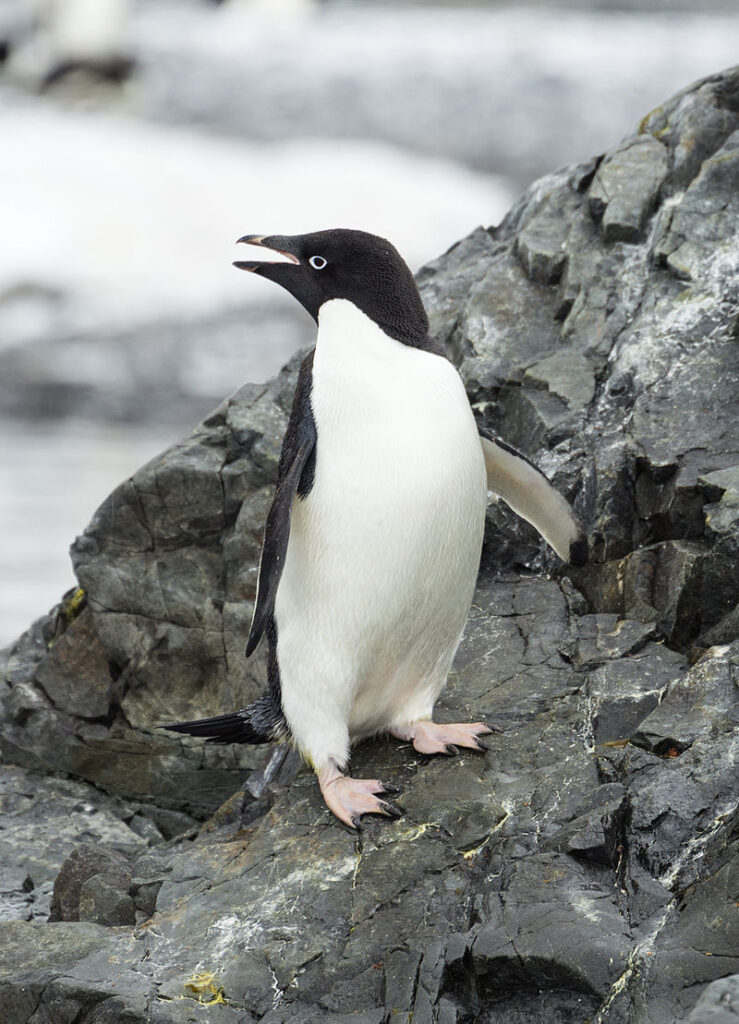The Adélie penguin is a species of penguin that inhabits the Antarctic continent and the surrounding coastal regions. They are named after Adélie Land, a region of Antarctica that was discovered by French explorer Jules Dumont d’Urville in 1840. These penguins are well adapted to survive in one of the harshest environments on Earth, but their survival is threatened by a rapidly changing climate.

Adélie penguins are one of the smaller penguin species, standing about 70 centimeters (27 inches) tall and weighing between 3.5 to 6 kilograms (7.7 to 13.2 pounds). They have a distinctive black and white plumage, with a white belly and a black head and back. Their flippers are used as wings to propel them through the water, and their feet are webbed for swimming. Adélie penguins are excellent swimmers, reaching speeds of up to 40 kilometers (25 miles) per hour.
These penguins are also well adapted to the extreme cold of the Antarctic environment. They have a thick layer of blubber and dense feathers that provide insulation and keep them warm. Adélie penguins also have a counter-current heat exchange system in their legs that prevents heat loss when they stand on the ice. They can withstand temperatures as low as -40°C (-40°F) and wind speeds of up to 100 kilometers (62 miles) per hour.
Adélie penguins Behaviour
Adélie penguins are highly social animals and form large breeding colonies, with some colonies numbering in the hundreds of thousands. They are migratory birds, spending the winter months at sea before returning to their breeding colonies in the spring to mate and raise their chicks.
Adélie penguins are monogamous and will typically mate for life. Breeding season begins in October, with males arriving at the breeding colonies first to establish territories and build nests out of rocks and pebbles. Females will then arrive a few days later and select a mate based on the quality of his nesting site and his vocalizations.
Once paired, the male and female will take turns incubating the eggs, with the male taking the first shift. Incubation lasts for around 35 days, after which the chicks hatch. The parents will then take turns caring for the chicks, with one adult remaining with the chick while the other goes in search of food. After around 50 days, the chicks are fully fledged and ready to leave the colony.
Adélie penguins primarily feed on krill, small shrimp-like creatures that are abundant in the Southern Ocean. They are also known to eat fish and squid. Adélie penguins hunt in the water, using their streamlined bodies to swim after their prey. They can dive to depths of up to 170 meters (557 feet) and can stay underwater for up to six minutes.
Threats to Adélie penguins
While Adélie penguins are well adapted to survive in the harsh Antarctic environment, their survival is threatened by a changing climate. The Antarctic Peninsula, where many Adélie penguins live, is one of the fastest-warming regions on Earth. The sea ice that Adélie penguins rely on for breeding and hunting is melting earlier in the year and forming later, reducing the amount of time they have to find food and raise their chicks.
In addition to the changing sea ice, Adélie penguins also face other threats from climate change. The warming temperatures can lead to an increase in the frequency and severity of storms, which can cause flooding and erosion of their breeding grounds. As the oceans become more acidic due to increased carbon dioxide levels, it can make it harder for Adélie penguins to find food, as it affects the growth and abundance of krill.
The Impact of Climate Change on Adélie penguins
To adapt to these changes, Adélie penguins are shifting their breeding and feeding patterns. Some populations are moving further south, where sea ice is more stable, while others are breeding earlier in the year to take advantage of the shorter breeding season. However, these adaptations may not be enough to ensure the long-term survival of Adélie penguins.
Conclusion
In conclusion, the Adélie penguin is a remarkable species that has adapted to survive in one of the harshest environments on Earth. However, their survival is threatened by a rapidly changing climate, which is altering the sea ice and food sources they rely on. It is essential that we take action to mitigate the impacts of climate change and protect these iconic birds for future generations.
Help us Help Them! Think Wildlife Foundation is a non profit organization with various conservation initiatives. Our most prominent campaign is our Caring for Pari intiative. Pari is a rehabilitated elephant at the Wildlife SoS Hospital. 25% of the profits from our store are donated to the elephant hospital for Pari. Other than buying our wonderful merchandise, you could donate directly to our Caring For Pari fundraiser.
